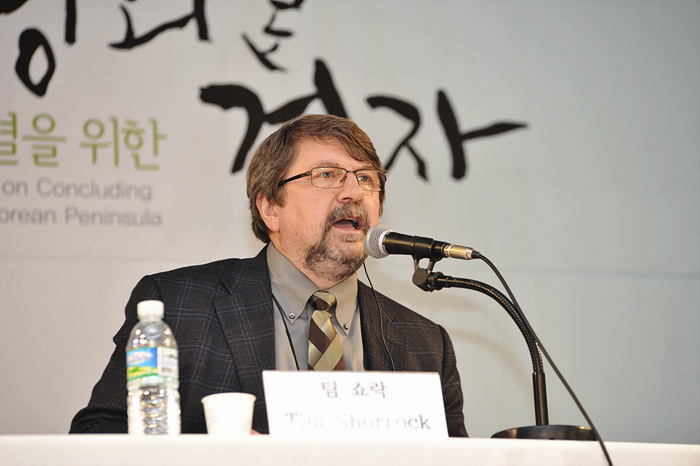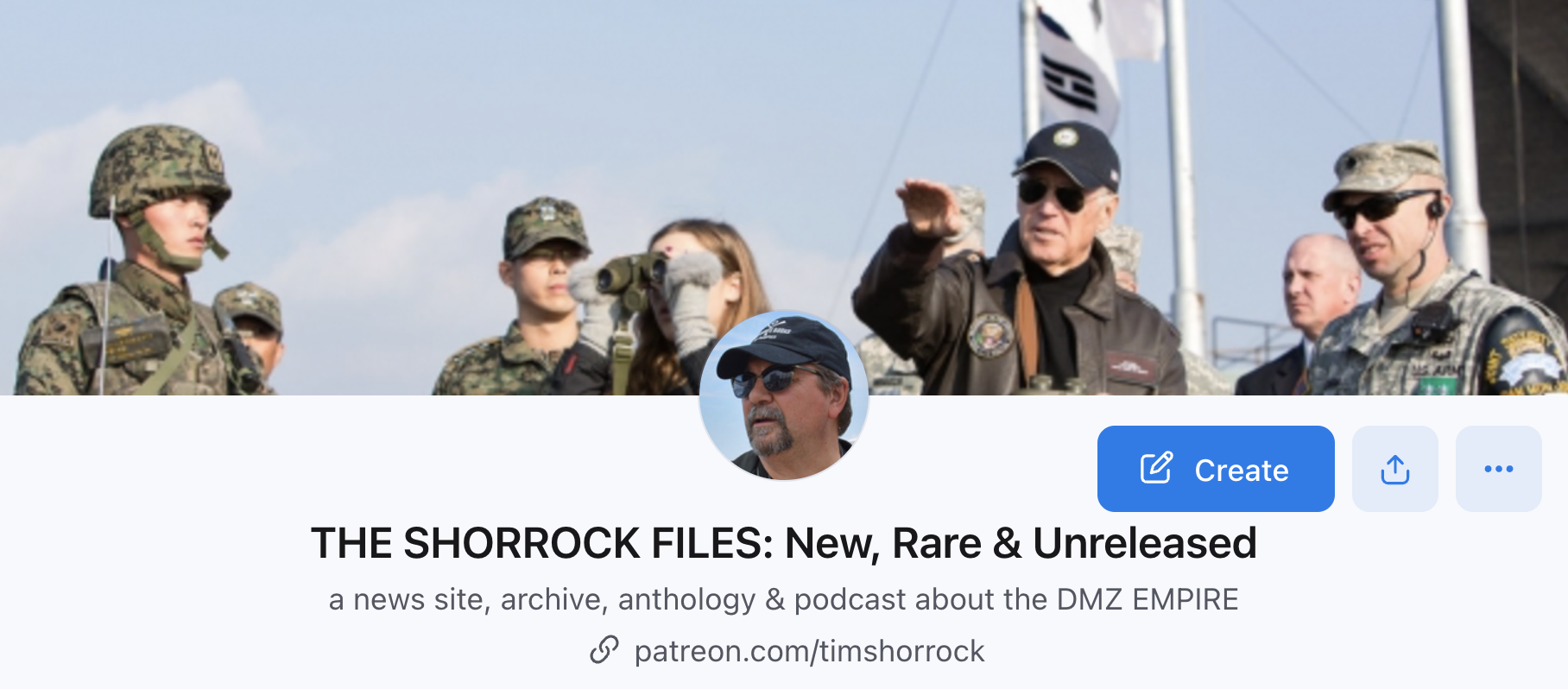On July 26, I spoke in Seoul at the “International Peace Symposium to Establish a Peace Treaty on the Korean Peninsula.” It was organized by the Progressive Policy Institute of the Unified Progressive Party, a coalition of peace, labor and civil liberties activists that holds six seats in South Korea’s National Assembly. Here are the remarks I gave at a panel that also included writers and activists from Japan and Korea; links were added later. You can read more about my visit here.
Good afternoon. Many of you in this room know me from my 1996 expose in the Journal of Commerce of declassified documents showing the previously hidden role of the United States in the 1980 military coup in South Korea and the Korean military’s suppression of the Kwangju Uprising. That was a big story for me – in part because the day after it was published, activists in Seoul organized a demonstration at the U.S. Embassy. It’s not often that a journalist gets such an immediate response to an article.
I want to thank the organizers of this conference for inviting me, and appreciate this opportunity to greet friends and allies from Korea, Japan and China in our joint quest for peace.
The question before us today is how to work together to end the hostility between the United States and North Korea, or the DPRK, and find a way to build peace and reconciliation on the Korean Peninsula at a time of great stress but also great opportunity. I speak to you as a journalist, trade unionist and political activist with roots in both America and East Asia, where I spent most of my youth.
I want to begin with the image you see on the opening page of my website at timshorrock.com. It is a magnificent photograph taken on April 19, 1960, at the height of the 1960 peoples’ revolution against the rule of Syngman Rhee. I was living here in Seoul at the time, as the son of Protestant missionaries, and that uprising influenced me deeply. For the first time in my life I saw students, workers and ordinary citizens take to the streets to demand democracy and an end to repression – and win. At the time, the United States seemed to play a neutral role, and even flew the dictator Rhee out of the country in a CIA plane. For a brief 12 months, there was a possibility of reconcilation with North Korea and an end to Korea’s tragic division.
But as we know too well, when General Park Chung Hee seized power in a military coup a year later, successive U.S. administrations backed him with extensive financial and military aid that lasted until he was assassinated in 1979. During that time, the US and South Korean military formed extremely close ties, starting of course in the destructive and immoral war in Vietnam. Today, as a result of this relationship, South Korea is the only country in the world where a foreign general takes command during times of war.
The Cold War relationship between the US and South Korea had severe economic repercussions as well. The years from the 1970s through the late 1990s were marked by intense U.S. pressure on South Korea to open its markets to Japanese investment and buy U.S capital goods, such as fighter jets and nuclear power plants, exclusively from American companies. After the financial crisis of 1997, the U.S. used the IMF to force open South Korean financial markets so U.S. banks such as the Carlyle Group could take over Korean firms. Even when military tensions have been high with North Korea, the U.S. and South Korea have clashed repeatedly over economic and trade issues. The current dispute over extending the U.S.-South Korean nuclear energy agreement is a case in point.
In fact, we can say that the Cold War created an unequal relationship between Washington and Seoul that has few precedents in the modern world. The United States frequently using its clout to further integrate South Korea into its global exercise of power. U.S. military and economic interests continually define U.S. ties with South Korea. In 1979 and 1980, when the Korean people rose up to demand an end to military rule, those interests proved to be far more important than human rights or democracy in determining U.S. policy. And unfortunately, they define it now.
Today, I’m afraid to say, most Americans see South Korea not as an independent nation that was tragically divided in 1945, but as 1) as the country we “saved” from communism during the Korean War and 2) an economic competitor to be feared. Little is known or understood about the origins of the Korean War or the terrible destruction caused by U.S. firepower. The U.S. backing for the dictators Park Chung Hee and Chun Doo Hwan are forgotten. As a result, too many Americans see South Korea as a junior partner to the United States, with little to offer except for “Gangnam Style” music. But their view of North Korea is much worse.
As reflected in the U.S. mass media, the DPRK is widely seen as a country run by mad men with no claim whatsoever to national sovereignity and a vassal of China that has no right to exist. These views, framed by decades of anti-communism and fed in part by racism, deny the true history and nature of Korea on both sides of the DMZ and are in my opinion the biggest barriers to peace in Korea. We see it reflected in U.S. foreign policy and, unfortunately, we see it reflected by the American progressive movement.
Let’s look first at American policy. Under President Obama, the United States has launched its largest military buildup in Asia since the Vietnam War. The policy is publicly aimed at “containing” China and North Korea, but is in reality another way to expand U.S. hegemony and power in Asia. U.S. bases in South Korea and Japan also serve as “aircraft carriers” that help U.S. forces extend their reach to Iraq and Afghanistan. These bases explain why the Pentagon continues to stall and resist South Korean efforts to win control of the U.S.-ROK Joint Command.
Moreover, the U.S contempt for South Korea is illustrated by the NSA’s surveillance of the South Korean embassy in Washington; if this is how allies are treated, who needs enemies? As people committed to peace and long-term stability, we need to organize against the joint command structure, which in my opinion deprives South Korea of its sovereignity. That must be part of our agenda to build conditions for a peace treaty that would end the current state of war on the Korean peninsula.
Now let me turn to the U.S. peace movement. Unfortunately, many Americans who should be our allies in building peace in Korea have adopted Cold War thinking as well. This is especially true of the press, which – as I’ve said – always portrays North Korea as the evil instigator and rarely mentions how U.S. policies, including threats to use nuclear weapons against the DPRK, have contributed to the tensions. But it’s also true of progressives as well.
Many of you fought against the Korea-U.S. Free Trade Agreement known as KORUS. You correctly saw KORUS as a treaty that will make it easier for capital to move across borders and hurt the interests of workers, unions, farmers and consumers. This view is shared by many U.S. trade unionists as well.
But the organization that led the fight against KORUS and is in the forefront of the fight against [the Trans-Pacific Trade Agreement known as] TPP seized on only one issue: the Kaesong Free Trade Zone (that, ironically, is about to reopen). In its literature and campaigns, this U.S. organization argued that Kaesong is a “slave labor” camp that will finance North Korea’s acquisition of nuclear weapons, and therefore its inclusion in KORUS had to be opposed.
This Cold War, simplistic view put this organization and many U.S. trade unions to the right of the most extreme elements of the Republican Party and even to the right of the very right-wing South Korean presidents Lee Myung-Bak and Park Geun-hye. Worse, it completely denies South Korea’s sovereign right to reduce tensions and build economic ties with North Korea on its own terms. With “friends” like this, you do not need enemies.
If we are to convince the U.S. government to even consider a peace agreement and end the Korean War, we must begin an education program to help Americans from left and right understand America’s historical role in Korea. We must also explain how a peaceful Korea moving towards reconciliation could benefit both the United States and East Asia by reducing military tensions and spending.
I encourage my Korean friends to seek out the U.S. media here, which has expanded considerably in recent years. Talk to American reporters, and correct them when they’re wrong. Come to the U.S. and explain to the peace and labor movements that Korea is more than “Gangnam Style” and Hyundai cars, but is a sovereign nation with a long history as a united country. Cold War ideology is a creature of the past: let’s work together to end 60 years of division and war and create a zone of peace and economic cooperation in Korea and beyond.
Thank you for your attention. I would be happy to consider any questions.


